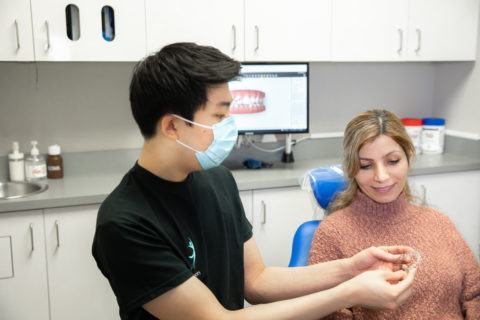
TMD Treatment
Temporomandibular Joint Disorder (TMD) can be a debilitating condition, causing pain and discomfort in the jaw joint and surrounding muscles.
Call us today!
(365) 659-4701
Facebook
facebook.com/markhamdentalhw/
Instagram
instagram.com/markhamdental/
Very professional and friendly staff, makes sure your teeth are in perfect health, using the latest dental technology for your teeth.
— Matthew Chen
In Case of a Dental Emergency Call
(365) 659-4701
Please remember we care about your privacy.
What Is TMJ?
TMJ refers to the temporomandibular joint—which connects the lower jaw to the skull—just in front of the ears. The joint allows for movements like chewing, speaking, and yawning by enabling the jaw to open, close, and move from side to side.
The TMJ is a complex structure made up of bones, muscles, ligaments, and a cartilage disc that helps absorb shock and ensures smooth motion. It plays a crucial role in daily functions, and its proper alignment and function are essential for comfort and efficiency in jaw movement.
If this joint becomes painful or stiff, it may indicate you’re experiencing TMJ disorder (TMD).
Understanding Temporomandibular Joint Disorder (TMD)
Temporomandibular Joint Disorder (TMD) can be a debilitating condition, causing pain and discomfort in the jaw joint and surrounding muscles. Symptoms may include difficulty chewing, talking, and even opening the mouth.
At Markham Dental, we understand the impact TMD can have on your quality of life and are committed to offering effective, noninvasive treatment options for relief.
For TMJ/TMD treatment in Markham, visit our dentists today!
Introducing Botulinum Toxin Type A (Botox) for TMD Treatment
Botulinum toxin type A, commonly known as Botox, has emerged as a promising treatment for managing TMJ pain and TMD. A minimally invasive procedure, Botox helps target muscle tension, reducing pain and providing significant relief for most patients.
How Botox Works for TMJ/TMD
Botox for TMJ/TMD works by blocking the signals between the nerves and muscles, reducing the ability of the affected muscles to contract. When injected directly into the muscles, Botox can help:
- Relax muscle tension: Reduce the frequent and often painful muscle contractions contributing to TMD symptoms.
- Alleviate pain: Provide pain relief by minimizing muscle strain and reducing inflammation.
- Improve jaw function: Enhance the ease of movement, making it easier to chew, speak, and open your mouth.
The treatment is safe, effective, and usually well-tolerated, offering a non-surgical alternative for those seeking relief from TMD.
Key Benefits for Patients Experiencing TMJ Pain
Patients undergoing Botox treatment for TMJ/TMD at Markham Dental usually experience several key benefits:
- Pain reduction: A decrease in jaw pain and overall discomfort.
- Increased mobility: Improved jaw function, making everyday activities like eating and speaking more comfortable.
- Minimally invasive: Benefit from a non-surgical approach that involves a quick, simple injection procedure.
- Quick recovery: Return to your daily activities immediately, with minimal downtime.
- Long-lasting relief: Results typically last several months, providing sustained relief from TMD symptoms.
- Comprehensive care: Complement other TMD treatments for a more holistic management approach.
Frequently Asked Questions (FAQs)
What is the process for administering Botox for TMJ/TMD treatment?
Botox is administered through small injections directly into the muscles responsible for TMD symptoms. The procedure typically takes 10-30 minutes in our office.
How long does it take to see the effects of Botox on TMD symptoms?
Patients often notice an improvement in their symptoms within a few days to a week after treatment. The full effects can take up to 2 weeks to become apparent.
Are there any side effects associated with Botox treatment for TMJ/TMD?
While Botox is generally safe and well-tolerated, some patients may experience mild side effects, such as localized pain, swelling, or bruising at the injection site. These side effects are usually temporary and resolve on their own.
How often would a patient need to receive Botox injections for TMJ/TMD?
The effects of Botox typically last 3 to 6 months. Depending on the severity of their symptoms and individual response to treatment, patients may require follow-up injections to maintain relief.
Can Botox be used in combination with other TMJ/TMD treatments?
Yes, Botox can be part of a comprehensive TMD treatment plan. It may complement other therapies such as physical therapy, oral appliances, or medications for optimal results.
Is Botox treatment for TMJ/TMD covered by insurance?
Coverage for Botox treatment for TMD varies by insurance provider. We recommend checking with your insurance company to determine if this treatment is covered under your plan.
Who is an ideal candidate for Botox treatment for TMJ/TMD?
Ideal candidates for Botox treatment are individuals who suffer from chronic TMD symptoms that have not responded well to other therapies. During your consultation, our team will assess your condition and determine whether Botox is the right option.
Schedule Your Consultation Today
If TMD affects your quality of life, it’s time to explore effective treatment options. Contact Markham Dental today to schedule your consultation and learn more about how Botox can help alleviate your TMD symptoms. Our experienced professionals are dedicated to providing you with the highest level of care and ensuring your comfort and well-being.
Rediscover the comfort and ease of a pain-free jaw with the innovative use of Botox for TMD at Markham Dental. Your journey to relief starts here.
Contact details
Markham Dental General and Cosmetic Dentistry
8241 Woodbine Ave, Unit 17, Markham, ON L3R 2P1
Email: [email protected]
In Case of Emergency Call
(365) 659-4701
To schedule an appointment, please fill out the adjacent form.
Book An Appointment

Book your appointment online!




